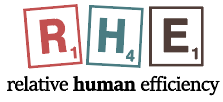IF WE CAN’T DO IT, IT DIDN’T HAPPEN
Relative Human Efficiency (RHE) claims that events which occur as the result of unguided natural processes can always be easily reproduced by human effort provided the requirements of matter, energy, space and time are within human capability. As such, it provides a test for the certain claims of naturalistic materialism.
RHE is represented to be a deductive premise, as valid as 2+2=4. Skeptics dispute this but the following is offered in support.
– There are a multitude of demonstrations where human effort is many orders of magnitude more efficient than unguided natural processes.
– There is no observed instance where unguided natural processes are more efficient than human effort.
– Human effort can be goal oriented, unguided natural processes are not.
– Human effort determines and applies principles that guide the achievement of results, unguided natural processes do not.
– Human effort learns from mistakes.
– Human effort can record and assemble small increments of success even though they may not occur sequentially.
– Unguided natural processes fail totally if a failure occurs at any step in a process. “Dead ends” are common.
